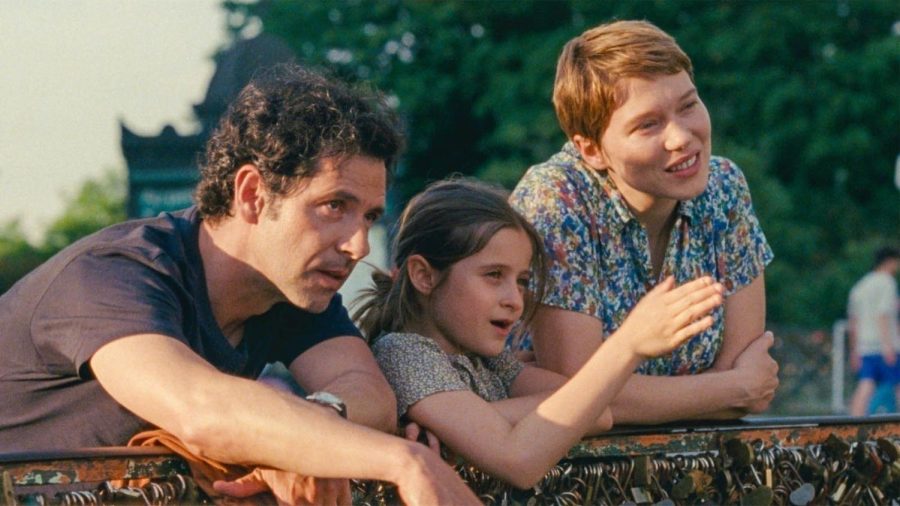The first interaction in “One Fine Morning” happens through a door. Sandra, played by Léa Seydoux, arrives at her aging father’s Paris apartment. It quickly becomes clear that Georg, played by Pascal Greggory, is struggling. In a characteristically soft voice Sandra reminds him where the door is, where he can find the key and that he has no cause for worry. It’s only when he finally opens the door and speaks with her that he processes and appreciates her coming.
“One Fine Morning” is full of quietly heartbreaking, deceptively complex moments like this. The film, directed by French auteur Mia Hansen-Løve, gives us a look into the world of Sandra, a translator and widowed single mother navigating the care of her ill father, the upbringing of her young daughter (Camille Leban Martins) and a budding affair with Clément (Melvil Poupaud), a married man.
Set in Paris, “One Fine Morning” feels as though it was grown in the soil of the city. Thanks in part to sunny cinematography from Denis Lenoir, the ever-present bustle of the city reminds us that this story is only one of many. We see the flora of the city transition from autumn to winter, as Georg’s health does the same. It’s easy to fantasize about Paris life while looking at the charming locales.
The restlessness of the streets introduces an unavoidable public element to an intimate moment between Sandra and Clément, their extramarital relationship being a risk. All these characters are a product of their environment, their home, making Georg’s relocation to a nursing home that much more devastating.
In other creative hands, a premise with so many tear-jerker elements could feel melodramatic. However, Hansen-Løve approaches the story as a series of casual moments rather than dramatic events. Her wide-open frames and honest dialogue make space for characters to simply exist within their environment. The result is a movie that’s as calm as any of Hansen-Løve’s films, but one with an emotional punch that sneaks up on you.
Those casual moments in cafes, in the park or simply walking down the street are where we get to know the many roles Sandra plays in her life. We see her go into mom mode trying to explain her growing relationship to Clément. We see her dutifully play the peacemaker of her family as they plan for the hospitalization of Georg. She does not wear these experiences on her sleeve, but Seydoux’s loaded performance shows us that she lives each of them every day of her life.
Though Léa Seydoux is best known in America for her more alluring roles in the James Bond films and Wes Anderson’s “The French Dispatch,” she plays Sandra with total ease, showing a quiet dedication to those in her life. The day-in day-out delivery of care has its own series of costs. The subtle changes in her eyes, from strength to heartbreak, from jealousy to embarrassment, are worth the price of the ticket alone.
There is certainly a liberated sexuality present in the film but it is deployed only in bursts. The chemistry between Seydoux and Poupaud’s Clément is strong, making her choice to engage that much more understandable. Even though we know of Clément’s marriage, we still want Sandra to feel the excitement she thought was only in her past.
Hansen-Løve has said that the film is based in part on her own experiences with her own dying father, similarly stricken with a neurodegenerative disease. Every film can be personal, but her experience with the material can be felt throughout this one. There is a particular care in the presentation of Georg that never feels leering or condescending.
“One Fine Morning” isn’t as ambitious as the writer-director’s previous work, “Bergman Island” starring Vicky Krieps and Tim Roth, but the story doesn’t call for the more playful story structure there. The precision of its storytelling makes it both intimate and engaging without ever coming off like it’s peddling a message or being overly didactic. Despite the sometimes-intense content of the film, it’s reaffirming to watch it unfold.
Thomas Machacz can be reached at [email protected].




















